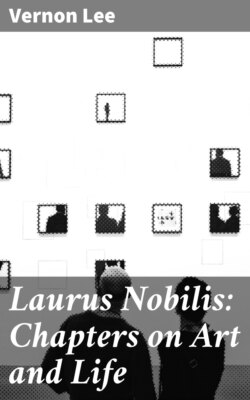Читать книгу Laurus Nobilis: Chapters on Art and Life - Vernon Lee - Страница 14
На сайте Литреса книга снята с продажи.
VIII.
ОглавлениеThere is a sad confusion in men's minds on the very essential subject of pleasure. We tend, most of us, to oppose the idea of pleasure to the idea of work, effort, strenuousness, patience; and, therefore, recognise as pleasures only those which cost none of these things, or as little as possible; pleasures which, instead of being produced through our will and act, impose themselves upon us from outside. In all art—for art stands half-way between the sensual and emotional experiences and the experiences of the mere reasoning intellect—in all art there is necessarily an element which thus imposes itself upon us from without, an element which takes and catches us: colour, strangeness of outline, sentimental or terrible quality, rhythm exciting the muscles, or clang which tickles the ear. But the art which thus takes and catches our attention the most easily, asking nothing in return, or next to nothing, is also the poorest art: the oleograph, the pretty woman in the fashion plate, the caricature, the representation of some domestic or harrowing scene, children being put to bed, babes in the wood, railway accidents, etc.; or again, dance or march music, and the equivalents of all this in verse. It catches your attention, instead of your attention conquering it; but it speedily ceases to interest, gives you nothing more, cloys, or comes to a dead stop. It resembles thus far mere sensual pleasure, a savoury dish, a glass of good wine, an excellent cigar, a warm bed, which impose themselves on the nerves without expenditure of attention; with the result, of course, that little or nothing remains, a sensual impression dying, so to speak, childless, a barren, disconnected thing, without place in the memory, unmarried as it is to the memory's clients, thought and human feeling.
If so many people prefer poor art to great, 'tis because they refuse to give, through inability or unwillingness, as much of their soul as great art requires for its enjoyment. And it is noticeable that busy men, coming to art for pleasure when they are too weary for looking, listening, or thinking, so often prefer the sensation-novel, the music-hall song, and such painting as is but a costlier kind of oleograph; treating all other art as humbug, and art in general as a trifle wherewith to wile away a lazy moment, a trifle about which every man can know what he likes best.
Thus it is that great art makes, by coincidence, the same demands as noble thinking and acting. For, even as all noble sports develop muscle, develop eye, skill, quickness and pluck in bodily movement, qualities which are valuable also in the practical business of life; so also the appreciation of noble kinds of art implies the acquisition of habits of accuracy, of patience, of respectfulness, and suspension of judgment, of preference of future good over present, of harmony and clearness, of sympathy (when we come to literary art), judgment and kindly fairness, which are all of them useful to our neighbours and ourselves in the many contingencies and obscurities of real life. Now this is not so with the pleasures of the senses: the pleasures of the senses do not increase by sharing, and sometimes cannot be shared at all; they are, moreover, evanescent, leaving us no richer; above all, they cultivate in ourselves qualities useful only for that particular enjoyment. Thus, a highly discriminating palate may have saved the life of animals and savages, but what can its subtleness do nowadays beyond making us into gormandisers and winebibbers, or, at best, into cooks and tasters for the service of gormandising and winebibbing persons?
